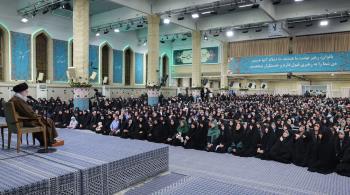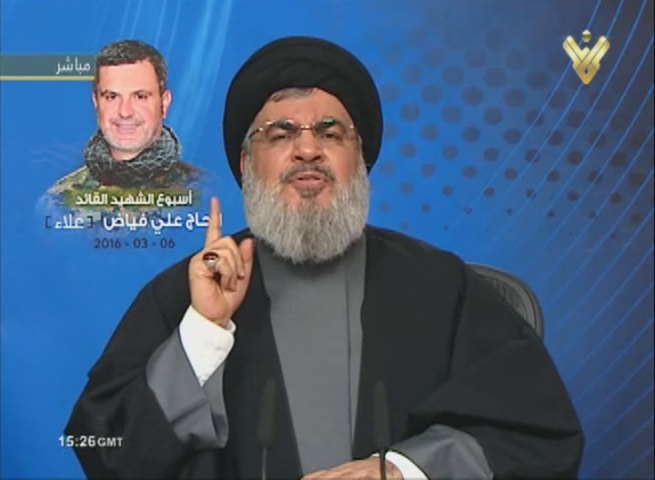Alwaght-Hezbollah Secretary General Sayyed Hasan Nasrallah has said the Saudi regime is outraged following its dismal failures in Yemen and Syria and thus blames Hezbollah for its shortcomings.
“We understand the rage of the Saudis who wanted to blame Hezbollah for all their failures in the entire region” Sayyed Nasrallah said while emphasizing that the Resistance feels proud for being viewed as the source of frustration for Saudi schemes.
Delivering a speech on Sunday during Hezbollah ceremony to mourn martyr commander Hajj Ali Fayyad, aka Alaa of Bosnia, Sayyed Nasrallah said that the party highly appreciates all who supported the Resistance against the recent decision by Persian Gulf Cooperation Council (P) GCC monarchies to label it as a terrorist group.
The Hezbollah chief went on to underline the popular reaction in a number of Arab countries to the (P) GCC’s decision against Hezbollah, considering that it indicates the sublime position of the Resistance among the Arab masses "who have kept the Palestinian cause as a priority."
"The Arab popular reaction challenged the political, takfiri, media and financial pressures in the region."
Sayyed Nasrallah noted that the popular reaction in a number of Arab countries sent a clear message to Israel that the Zionists can never be the guardians of Sunni Muslims.
"The message also stresses that the Israeli existence in the region can never be normalized despite all the attempts on the Zionist officials and some Arab leaders."
"The Bahraini regime jails the Muslims clerics and receives a Zionist Rabbi to highlight its relations with Israel."
On the contrary, Sayyed Nasrallah cited the instance of the Egyptian parliament where one MP beat his colleague with his shoes for hosting the Israeli regime’s ambassador in his house adding that the incidents points to the real attitude of the Egyptian masses towards the Israelis despite Camp David accord.
Sayyed Nasrallah said any Arab regime which normalizes ties with the Israeli regime will eventually collapse.
"O' Zionists, if any Arab regime supports you, it will fall along with you."
Sayyed Nasrallah noted that the Saudi regime will soon discover that it has lost its battle in the entire region.
The Hezbollah leader underlined that the recent tensions in the Lebanese-Saudi relations are the result of Saudi regime’s five year catastrophic failure and disappointment in Lebanon, Syria, Iraq, Yemen and Bahrain.
He went on to explain that the Saudi rage has emanated from the kingdom’s failures in Yemen and Syria.
“In Syria, there’s a very great Saudi anger because what they had calculated in Syria [was that] in two or three months, ‘Syria would fall into our hands,’” Nasrallah said.
Hezbollah has been successfully aiding the Syrian military against foreign-backed militant groups.
“He, who confronts Saudi Arabia in Syria is the real defender of the Lebanese national interests,” Nasrallah said.
“The same goes for Yemen. The estimations of the new Saudi leadership was that ‘we will decide the battle in Yemen. We will teach a lesson to all the Arab countries and the Arab world… and we will impose ourselves on the Arab world,” he said.
Sayyed Nasrallah explained what happened in one of the care houses few days ago in Yemen's Aden where the terrorists stormed a building and killed a number nuns, Muslim elders and Indian nurses, considering that they are disbelievers.
Saudi Arabia launched a campaign of military aggression against Yemen in late March last year in a bid to bring fugitive former Yemeni President Abd Rabbuh Mansur Hadi, a Riyadh ally, back to power and undermine Yemen’s Houthi Ansarullah movement.
Riyadh has, however, failed in accomplishing either of the two objectives, and has become entangled in a prolonged expensive war, whose adverse economic impacts—along with economic mismanagement—have gradually been giving rise to domestic discontent inside Saudi Arabia.
Sayyed Nasrallah wondered, "what would have happened in Lebanon if the terrorists had achieved victory in Syria?"
Sayyed Nasrallah hoped that the Arab countries halt troubling the Resistance as they did during 2006 war, adding that the Arab regimes, including mainly the Saudis, have always worked to protect 'Israel' in order to ignite tensions and infighting among Sunni-Shiite Muslims.
He underscored that, "Hajj Alaa and his brethren did not wait for the Arab league to conclude an Arab consensus and a unified strategy in order to fight the Israelis."
Sayyed Nasrallah went on to say that, “We have resorted to the resistance path in order to liberate our territories and defend our country against the Israeli enemy. Arab countries that are blacklisting Hezbollah today have done nothing for the Resistance. The people-army-resistance formula has always protected Lebanon against the Israeli threats, not the Arab league."
"The Saudi regime schemes conspiracies against all who try to confront the Zionist entity."
Sayyed Nasrallah said that Hezbollah sent a group of his fighters and commanders to Bosnia during the nineties, including Hajj Alaa, to defend the Muslims, wondering if this act can be considered as terrorist.
Sayyed Nasrallah asked, "For those who accuse Hezbollah of sectarianism, are the Muslims in Bosnia Sunnites or Shiites?."
Sayyed Nasrallah added that Hajj Alaa went to defend the Sunni Muslims in Bosnia, sacrificing martyr Ramzi Mahdi, for the sake of Allah.
On the contribution of Hajj Alaa in Iraq, Sayyed Nasrallah clarified that after ISIS terrorist group invaded in 2014 Mosul, Anbar, parts of Salaheddine and Kirkuk and reached areas near Baghdad, and entire Iraq became in danger; the Iraqi leadership asked Hezbollah to send a number of commanders and military trainers to help the local forces defend their country.
"Hajj Alaa was one of the first Hezbollah commanders who joined the Iraqi forces to fight against ISIS."
Addressing the Saudis, Sayyed Nasrallah said, "You have formed a coalitions that is composed of 70 countries, yet it has failed to reach any battlefield advance against ISIS."
"What is ironic is that Saudi has formed an Islamic coalition, but the US heads the coalition!"
“It would be misleading to think that we would wait for the Arab League approval in order to help the Iraqis against ISIS. We were fighting in Iraq under an Iraqi leadership, and if we were fighting under an American leadership, they would not label us as terrorist,” he added, referring to the Persian Gulf Cooperation Council resolution.
To the Persian Gulf monarchies, Sayyed Nasrallah said, “If it had not been for the Popular Mobilization forces in Iraq, ISIS would have been now in your palaces and it would have been killing you and enslaving your women.”
“Arab chivalry is when every Arab goes to Iraq to defend the dignity and holy sites of the Iraqis, not to label those defending Iraq as terrorists,” Hezbollah Secretary General went on to say.
"ISIS would have destroyed the holy shrines in Iraq if it had not been confronted."
Sayyed Nasrallah also clearly stated that, "Hezbollah gained a religious approval from the Supreme Leader Sayyed Ali Khamenei to fight in Syria, but his eminence did not oblige the party to intervene in the Syrian fight."
The Resistance will keep the Umma's hope of defeating the enemies, if God wills, Sayyed Nasrallah concluded.



























